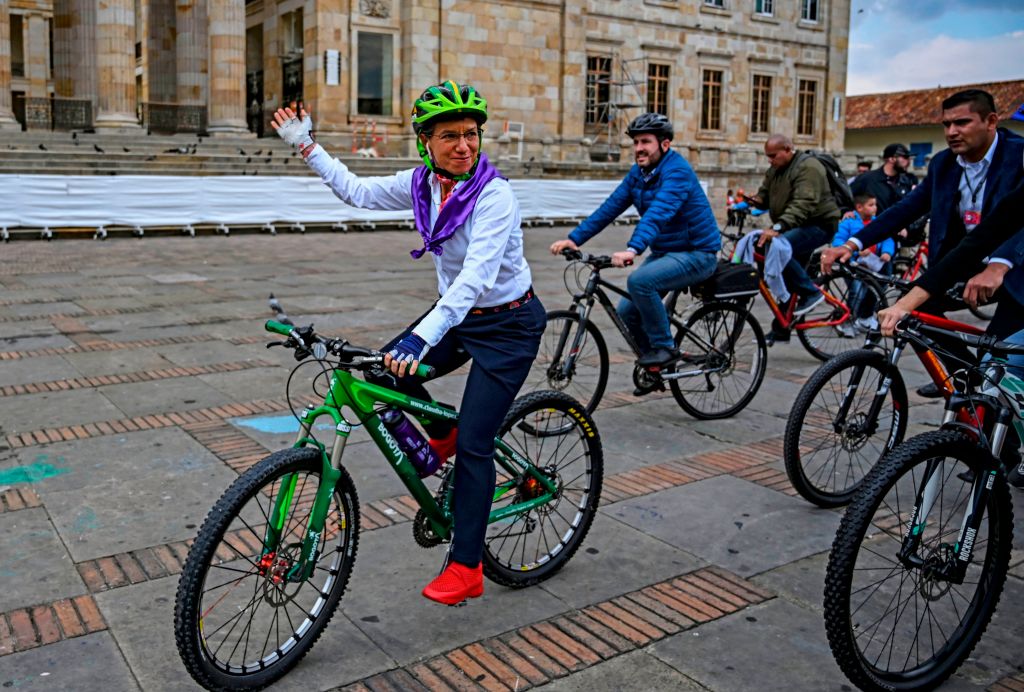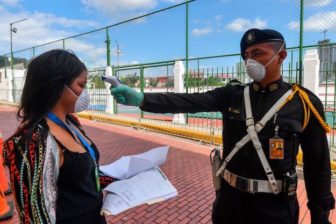The demand of social distancing is forcing cities across Latin America and the world to rethink public life. That includes a reconsideration of mass transit, with a number of public sector initiatives encouraging biking as a safer alternative.
Already, city leaders in Bogotá, Lima, Buenos Aires and elsewhere have taken steps to promote biking as a reliable form of transportation for essential workers without the risks of spreading the coronavirus in a crowded train or bus. The pivot to bikes presents an opportunity that biking activists and enthusiasts hope could lead to lasting changes in urban mobility.
“The health crisis is an opportunity to promote the use of the bike not only as a temporary solution, but to become a permanent part of our future transportation systems,” Juan Carlos Silva, vice president of Peru’s cyclists association Aciper told AQ.
The region is plagued by congestion, traffic and long commutes. Last year, Bogotá ranked first in the Inrix Global Traffic Scorecard, followed by Rio de Janeiro and Mexico City. Now, changes propelled by the pandemic could help improve the situation in the long-term. After Bogotá first instituted lockdown restrictions in March, Mayor Claudia López’s government began adding new miles of bike lanes to the city’s existing network. López – an outspoken advocate for cycling – also announced that the Ciclovía, a stretch of roadway that is normally closed off on Sundays for bicycling, would be closed to cars during weekdays as well.
“Now I bike 12 miles to and from work everyday,” said essential worker Cindy Palacio, a scientist at a pharmaceutical company in Bogotá. “It might be a long ride, but it’s the safer option for both my health and security.”
On May 8, López announced that the city would expand its existing network of permanent lanes by about 15%. The city has also taken steps to facilitate the launch process for bike and scooter rental companies.
Other cities in the region are also recognizing biking’s importance to stemming the coronavirus’ spread. On May 11, the city of Buenos Aires reopened the capital’s EcoBici bike share system and encouraged its use for frontline workers, stressing a new cleaning schedule to prevent contagion. Mayor Horacio Rodríguez Larreta, meanwhile, announced bicycles can now be transported on the subway in an effort to facilitate their use. In Lima, city officials announced plans to develop a network of 187 miles of temporary emergency bicycle lanes. In Peru, the cyclists association Aciper has petitioned the government to make these bike lanes permanent, which would almost double existing bike infrastructure.
Elsewhere in the region, civil society isn’t waiting on the city take the lead. Areli Carreón, a prominent biking activists known as Mexico City’s “Bike Mayor,” has presented plans to the city to build 80 miles of temporary bike infrastructure to alleviate the risks of public transportation usage. However, she says she has received no response from the city’s secretary of mobility. “I am very disappointed by the city’s failure to act,” Carreón told AQ. “Upgrading bicycle infrastructure was already urgent before the crisis.”
Carreón’s plan has the endorsement of the WHO and she intends to present her plans directly to Mexico’s National Sanitary Council in the upcoming weeks. If her plan is set in motion, cycleway networks would increase four-fold.
Across the region, reimagining urban transportation systems will take innovative thinking – especially during a massive economic crisis. In Lima, the department of urban transport has announced plans to develop a prototype of an inexpensive yet safe bicycle that would cost commuters no more than 350 soles, or about $100. An investment in this bicycle could be recovered in two months by saving on conventional public transport, not to mention the public health benefits, according to María Jara, Peru’s former minister of transportation and communication.
Bogotá, meanwhile, launched an initiative with the bikeshare company Muvo to provide free access to a fleet of electric bikes for medical workers. To this end, Muvo repurposed its entire fleet of 400 bicycles. Similar initiatives are underway in Santiago. In Rio de Janeiro and other Brazilian cities, the bike share company Tembici launched a social media campaign to discourage non-essential workers from using the service – even offering to return membership fees to users who don’t use their services.
COVID-19 is testing urban resilience throughout the region, prompting creative responses and flexibility from both the public and private sector. For activists and bikers who have been pushing for more bike-friendly roads, the current embrace of bicycles is encouraging. But in the long-term, that progress could hit a road bump.
“I am optimistic, but we have to continue to put pressure on the government,” said Silva, of Lima’s Aciper. “Real change will depend on the political will from decision makers and the technical capacity of public policy makers.”
Rauls is an editorial intern at AQ






